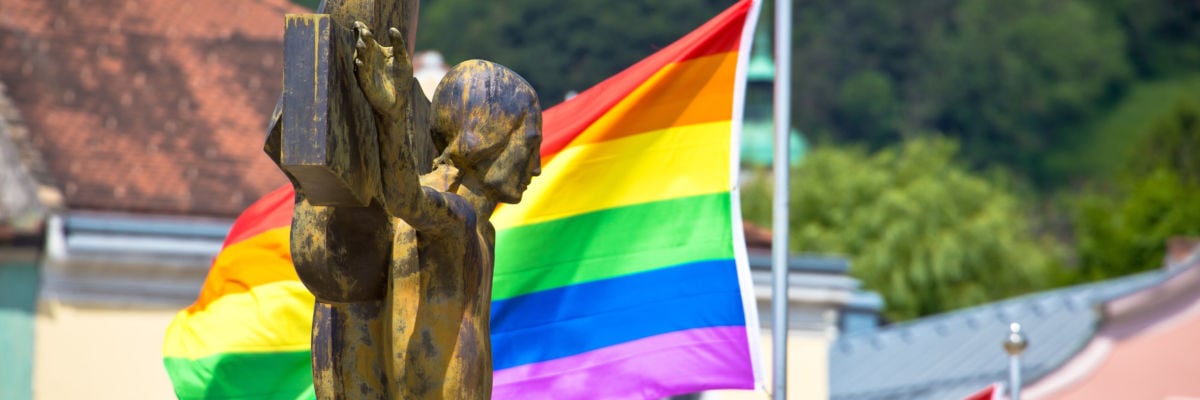
Catholic apologist Joe Heschmeyer joins host Thomas Graf to address a caller’s worry about why so many Catholic LGBT youth seem to be leaving the faith.
Transcript:
Caller: Hello, guys. It’s a pleasure talking to you both. So my question is this. I read online that over 60% of Catholic LGBT youth end up leaving the faith by the time they turn 29. I don’t know if this is true or not, because there are several figures. Some say like 50%, some say 80%, but I think the point still stands. So my question is this. What are we doing wrong as Catholics, and what can we do to prevent them from leaving to begin with?
Joe: Yeah, that’s a really good question. I think there’s a couple of things. One, I’m actually a little dubious about any of those survey questions because the huge underlying question is what defines someone as LGBT youth? If it’s someone living a gay lifestyle, then obviously people who have left the church are way more likely to self-identify that way than people who are living chastely who might have same-sex attraction. So that’s going to create some really skewed numbers.
So I don’t know what the actual numbers are. Nevertheless, whatever the numbers are, we don’t want people to leave the church, and we want to help give them the tools to be the full, vibrant members of the church that God created them to be.
So I’d say, number one, one of the attractive things about the broader, whatever you want to call it, LGBT community is the creation of a sense of identity. One of the hallmarks of the modern age, regardless of one’s sexuality, is a yearning for identity, a yearning for a sense of belonging, and for a sense of knowing where you belong in relation to others.
And we live in a world that has really stripped that away from a lot of people, where people feel very alone and isolated. You add to that things like sexual shame, and it can be this incredibly isolating and incredibly unhappy sort of experience.
And so creating community and creating identity is really vital work. Again, regardless of one’s sexual attraction orientation, whatever, this is really important work to do.
In the case of people who say, “Hey, I’ve got these sexual desires that the church tells me are wrong, but the broader culture celebrates and tells me they’re good and normal and I can be happy,” it’s easy to see the appeal.
Now, I think we have to continue telling the truth about this and to say this won’t make you happy. The point of us saying this is wrong is not to shame or condemn you. The point of us saying this is wrong is to warn you this is not where you will find the true happiness God intended for you.
So I would say, in addition to stressing that you have a home here, you have a place, you have an identity here, and it’s something bigger than your sexual identity or attraction. It’s being a beloved son or daughter of God. That’s immeasurably more.
Because all of us have this battle where we have to say, “Okay, do I want to live by my sexual and romantic urges, or do I want to live in accordance with my baptismal priesthood and in accordance with the idea that I’ve been made a beloved son or daughter of God?”
If you discovered tomorrow that you were a misplaced royal and you actually were the next in line for the throne, this would be incredibly transformative for your life. But you’d be expected to live a different way. And that’s how Christianity is as well. You have a royal identity, but with that comes a duty to live in a certain way in accordance with your dignity, in accordance with who you were made to be.
And there are some things that you might want to do that aren’t in keeping with that dignity. So I would stress those things. Stress the sexual identity in the broader context of your identity in Christ and the sexual morality, and everything flows from that naturally, because morality is always tied to identity.
If I want to know what I am allowed to do, I have to know who I am and what is expected of me. So I would say stress those things and then be honest about the often painful outcomes of people who’ve gone the other way with it. That all that glitters is not gold and the grass is not greener on the other side there. That it’s often a place of real misery.
If you want some concrete tools, the Courage program that Father Paul Check has been involved with, and Father Paul Scalia was very involved with, has provided a great deal of support in just creating some identity for people with this struggle.
I know Desert Streams has done great work. Andy Kaminsky and Marco Casanova—actually, I’m newly godfather to his daughter as of yesterday—do tremendous work in this area. Both of those men have come out of that lifestyle and embraced a different way of living and are tremendously happy as a result of it. Not in a sense of repressing their identity, but finding a yet deeper identity.
So I think that would be the kind of notes I would hit and then just, you know, recognize like, you’ve got to give people some space. There’s a natural shame around sexuality, and you don’t want to lean into that in a way that makes it worse. But you want to give space for people to be struggling and to fall short sometimes.
Thomas: Tony, thank you so much for that call. We are near the end of the show, so I do want to just head right down the line and go to our next caller, Sherry.



